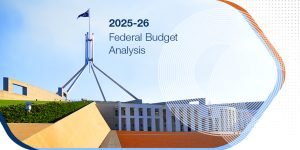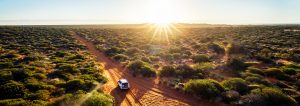AUTUMN 2024
Posted on MARCH 5, 2024

After a summer of quite extreme weather in many places around Australia, we can hopefully look forward to the cooler, calmer weather that Autumn brings.
While economic bright spots can be found in Australia right now, there are also some less than stellar results.
On the positive, inflation has remained at a two-year low giving some commentators confidence of a rate cut in the coming months. CPI was steady at 3.4% in the 12 months to January. In other good news, business capital investment rose in the December quarter to be 7.9% higher than it was 12 months before and average weekly earnings rose by 4.5% or $81 per week.
It has been a mixed report for retail, with a 1.1% increase in sales for January but that wasn’t enough to make up for the 2.1% loss in December.The Australian dollar remains in the doldrums, weakening below 65.2 US cents after reaching a high of 69.48 near the end of 2023.
Australian shares were up by just over 1% for the month after a shaky start thanks to worries over US interest rates and China. US stocks edged higher during February with the S&P 500 and the Dow Jones Industrial Average reaching record highs during the month. February was dominated by news of the massive profit report by artificial intelligence chipmaker Nvidia, which had a massive effect on markets across the world.
In this issue:

Understanding the new $3m super tax
The much-debated tax on superannuation balances over $3 million is inching closer and those who may be affected should ensure they have considered the implications.
Although it is not yet law, the Division 296 tax should be taken into account when it comes to investment strategy and planning, particularly in relation to any end-of-financial-year contributions into super.
Tax for higher account balances
The new tax follows a Federal Government announcement it intended to reduce the tax concessions provided to super fund members with account balances exceeding $3 million.
Once the legislation passes through Parliament and receives Royal Asset, Division 296 will take effect from 1 July 2025. Division 296 legislation imposes an additional 15 per cent tax (on top of the existing 15 per cent) on investment earnings of a super account where your total super balance exceeds $3 million at the end of the financial year.i
The extra 15 per cent is only applied to the amount that exceeds $3 million.
Given the complexity of the new rules, it is important to seek professional advice so you can make informed decisions.
How the new rules work
A crucial part of the new legislation is the Adjusted Total Super Balance (ATSB), which determines whether you sit above or below the $3 million threshold.
When assessing your ATSB, the ATO will consider the market value of assets regardless of whether or not this value has been realised, creating a significant impact if your super fund holds property or speculative assets. The legislation also introduces a new formula for calculating your ATSB for Division 296 purposes.
The legislation outlines how deemed earnings will be apportioned and taxed, based on the amount of your account balance over the $3 million threshold.
Negative earnings in a year where your balance is greater than $3 million may be carried forward to a future financial year to reduce Division 296 liabilities. If you are liable for Division 296 tax, you can choose to pay the liability personally or request payment from your super fund.
Strategic rethink may be needed
For many fund members, superannuation remains an attractive investment strategy due to its favourable tax treatment.ii
But those with higher account balances need to understand the potential effect of the Division 296 tax. For example, given the new rules, you may need to consider whether high-growth assets should automatically be held inside super.
Holding long-term investments that may be more difficult to liquidate, such as property, within super may be less attractive in some cases, because the new rules create the potential to be taxed on a gain that is never realised. This could occur where the value of an asset increases during a financial year but drops in value by the time it is actually sold.
For some, holding commercial property assets (such as your business premises) within your SMSF may be less attractive.
It will also be important to balance asset protection against tax effectiveness. For some people, the asset protection provided by the super system may outweigh the tax benefits of other investment vehicles, such as a family trust.
Division 296 will require more frequent and detailed asset valuations, so you will need to balance this administrative burden with the tax benefits of super.
Estate planning implications
Your estate planning will also need to be revisited once Division 296 is law.
The tax rules for super death benefits are complex and should be carefully reviewed to ensure you don’t leave an unnecessary tax bill for your beneficiaries.
If you still have many years to go before retirement and hold high-growth assets in your fund, you will need to closely monitor your super balance.
If you want to learn more about how Division 296 tax could affect your super savings, contact our office today.
i https://treasury.gov.au/sites/default/files/2023-09/c2023-443986-em.pdf
ii https://www.ato.gov.au/individuals-and-families/super-for-individuals-and-families/super/growing-and-keeping-track-of-your-super/caps-limits-and-tax-on-super-contributions/understanding-concessional-and-non-concessional-contributions

Insurance is a sound investment
Managing risk is an essential part of investment strategy to reduce the potential for losses.
Risk is not just associated with investing though - life can throw a curve ball or two and insurance is one way to manage risk in a broader context.
It’s a matter of weighing up your risks and thinking about what you would do if the worst happened. Could you afford to build a new house, buy a new car or support your family if you became too ill to work?
Various insurance products or self-insurance can help to mitigate these types of risks.
Underinsurance
While many Australians have some form of life insurance through their superannuation, the level of cover is rarely sufficient. The standard offering within the super framework is well below what your family need to live comfortably should you die or lose your ability to earn an income.
A Financial Services Council report, estimates that as many as one million Australians are underinsured for death and total permanent disability (TPD) and 3.4 million for income protection.i
Rice Warner estimates that insurance cover for a 30-year-old with dependents should equal eight times the annual family income for life insurance, four times the family income for TPD and 85 per cent of the family income for income protection. The default superannuation offering falls well short of this figure.ii
Home and contents
But it’s not just life insurance. There is also a fair amount of underinsurance in home and contents.
With the growing incidence of bushfires, floods and storms, protecting your home and possessions with insurance is more important than ever.
The biggest mistake is insufficient cover to rebuild your property particularly with the recent surge in building costs. You should also consider the costs associated with demolition and removal of debris, the cost of architects and builders and the need to find alternative accommodation while your home is being rebuilt.
It is important not to head for the cheapest policy as this may well fail to meet your needs. Read the product disclosure statement to make sure the cover delivers exactly what you need.
Health and travel
Health insurance and travel insurance are also important considerations.
You will pay a Medicare Levy surcharge if you do not take out private health insurance and have a taxable income above $93,000 for singles or $186,000 for a family, couple or a single parent (increased by $1,500 for each dependent child after the first child). This starts at 1 per cent of your taxable income and goes up to 2.5 per cent. So, it is worthwhile weighing up whether taking out private health insurance is the better option.iii
When it comes to travel insurance, if you can’t afford it, you can’t afford to travel overseas, according to the Federal Governments Smart Traveller website.iv The cost of medical care in other countries can be exorbitant and you may need to be transported back to Australia. The expenses can be enormous.
Of course, travel insurance can also help to compensate for cancelled or delayed trips and lost luggage.
Self-insurance alternative
An alternative to taking out an insurance policy is to self-insure. That means putting money aside regularly to build up a big enough fund to help keep a roof over your head or replace a vehicle.v
The upside is that these funds are yours and, properly invested, can grow over time. The downside is that you may not have enough money together when a disaster happens.
Insurance can be the difference between successfully recovering from an event and changing your life forever. If you would like to discuss your insurance needs, call us.
i https://fsc.org.au/resources/2537-fsc-australias-life-underinsurance-gap-research-report-2022/file page 18
ii https://www.ricewarner.com/life-insurance-adequacy/
iii https://www.ato.gov.au/individuals-and-families/medicare-and-private-health-insurance/medicare-levy-surcharge/medicare-levy-surcharge-income-thresholds-and-rates
iv https://www.smartraveller.gov.au/before-you-go/the-basics/insurance
v https://www.investopedia.com/terms/s/selfinsurance.asp

Evidence-based ways to hold back the hands of time
You can’t stop the clock, so the saying goes, but humanity has spent a long time trying to slow down or even reverse the effects of aging.
Even today it can be hard to distinguish those measures that work from those that may not work and avoid those that may be downright dangerous! Fortunately, science- based public health research has some of the answers, so for some medically backed ways to stay healthy as you age- read on.
But first let’s look at mankind’s long history of trying to stop the clock, or at least slow it down a little. Anti-aging practices included the Egyptian queen Cleopatra bathing in donkey’s milk, 16th century French courtesans drinking suspended particles of gold, and the Spanish explorer Juan Ponce de Leon’s infamous quest for the legendary fountain of youth. Unfortunately, many of these measures weren’t successful and may have actually shortened rather than lengthened the live spans of those trying them.
Today the quest continues…
The quest for the fountain of youth has not ceased - it’s just taken other forms in today’s society. The anti-ageing market is ever expanding and expected to be more than $119.6 billion globally.i
American tech centimillionaire Bryan Johnson is a significant contributor to that figure, reportedly spending $2 million a year on a complex regime designed to reduce his biological age from 45 to 18, which includes injecting himself with his 17-year-old son’s plasma.
The truth is, aging is natural. Our bodies aren’t meant to stop aging entirely. But the good news is that there are some tried and true, medically proven ways to stave off many of the problems associated with aging and, in some cases, slow down the aging process. While none of these are groundbreaking discoveries, it’s worth keeping in mind that you don’t have to spend all your money or waking hours to stay healthy as you age.
Tips for living well and living long:
Move it!
That treadmill at the gym may not be a time machine but it can play a part in slowing down the clock. In fact, research showed that those who ran a minimum of 30-40 minutes, five days a week, had an almost nine-year “biological aging advantage” over those who lived a more sedentary lifestyle.”ii Doctors call physical exercise a “polypill” because it can prevent and treat many of the chronic diseases associated with aging and it’s never too late to start getting the benefits from regular exercise. Even a daily walk can do wonders!
Stress less
It’s no secret that being in a constant state of stress is wearying and can make you feel older than your biological age, but recently scientists confirmed that exposure to stress can cause inflammation and damage to DNA in cells, which in turn can accelerate aging.iii The good news is this can be reversed using stress busting techniques such as mindfulness meditation, breathing exercises and progressive muscle relaxation which can lead to improvements in various biological markers associated with aging.
Nourish yourself
While there is plenty of hype around the plethora of “superfoods” that are touted to possess anti-aging qualities there is no one food that will significantly impact the aging process and turn back the clock. However, the food and drink we put in our bodies day after day does make a difference to our health as we age. Research from the worlds “Blue Zones” - areas where people tend to reach the age of 100 - demonstrate the benefits of a relatively plant-focused diet consisting largely of vegetables, fruits, grains, and legumes.iv
Maintain a positive mindset and embrace aging
Finally, it’s also worth considering that as we can’t beat the clock, we might as well accept, if not embrace, the gifts that come with age (wisdom and a longer-term perspective come to mind!).
And moving through life with a positive mindset about the aging process might also give you more days to enjoy. A study recently confirmed that those with a positive view of growing older lived seven years longer than those who complained about it.v
All in all, life is to be lived to the fullest and it’s precious because it’s finite. Do what makes you feel healthy and gives you joy now and that will also help you to enjoy life in the future.
i https://www.globenewswire.com/en/news-release/2022/03/29/2412093/0/en/Anti-aging-Market-Size-to-Worth-Around-US-119-6-Bn-by-2030.html
ii https://news.byu.edu/news/high-levels-exercise-linked-nine-years-less-aging-cellular-level
iii https://www.healthline.com/health-news/stress-can-increase-your-biological-age#How-stress-ages-the-body
iv https://www.everydayhealth.com/diet-nutrition/the-blue-zone-diet-a-complete-scientific-guide/
v https://pubmed.ncbi.nlm.nih.gov/12150226/
RECENT POSTS
Much of the 2025 Federal Budget was already known, after a volley of pre-election spruiking for votes. But Treasurer Jim Chalmers had one surprise up his sleeve – $17 billion in tax cuts. The first round of cuts will kick in on 1 July 2026 and second round on 1 July 2027, saving the average earner $536 each year when fully implemented.
As we say goodbye to the heat of summer, we can look forward to enjoying the cooler days ahead. Along with the drop in temperature, the RBA brought much relief to mortgage holders and dropped the cash rate by 25 basis points in February. The cash rate is now sitting at 4.10 per cent following the first rate-reduction since November 2020.
As investors grapple with uncertainty, keeping a cool head has never been more important.




